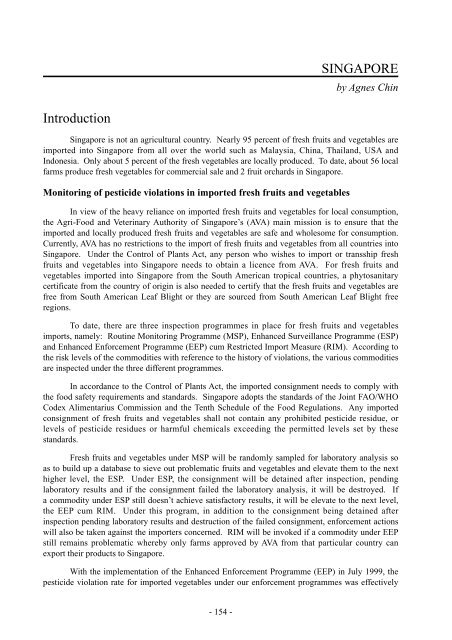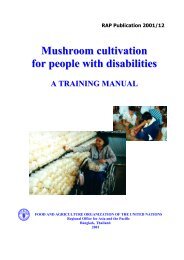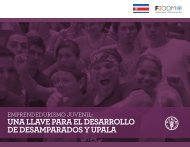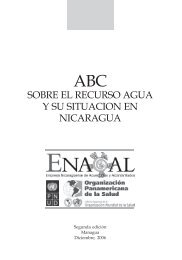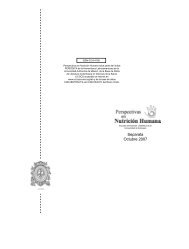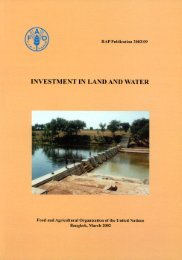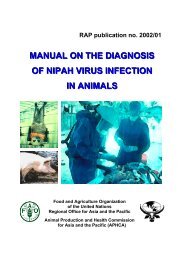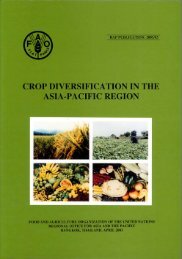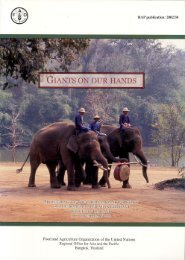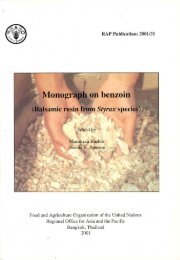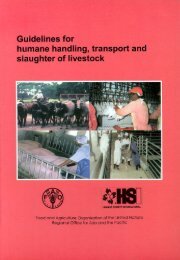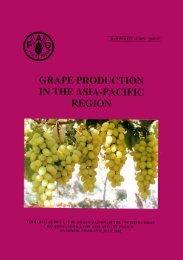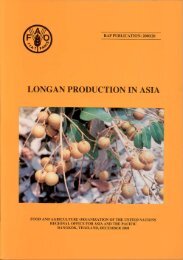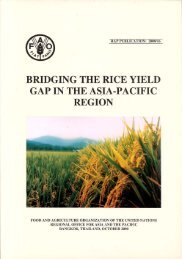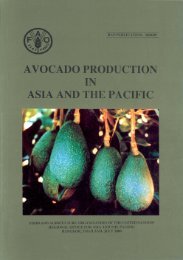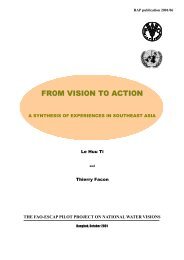Proceedings of the Asia regional workshop on the
Proceedings of the Asia regional workshop on the
Proceedings of the Asia regional workshop on the
You also want an ePaper? Increase the reach of your titles
YUMPU automatically turns print PDFs into web optimized ePapers that Google loves.
Introducti<strong>on</strong><br />
- 154 -<br />
SINGAPORE<br />
by Agnes Chin<br />
Singapore is not an agricultural country. Nearly 95 percent <str<strong>on</strong>g>of</str<strong>on</strong>g> fresh fruits and vegetables are<br />
imported into Singapore from all over <str<strong>on</strong>g>the</str<strong>on</strong>g> world such as Malaysia, China, Thailand, USA and<br />
Ind<strong>on</strong>esia. Only about 5 percent <str<strong>on</strong>g>of</str<strong>on</strong>g> <str<strong>on</strong>g>the</str<strong>on</strong>g> fresh vegetables are locally produced. To date, about 56 local<br />
farms produce fresh vegetables for commercial sale and 2 fruit orchards in Singapore.<br />
M<strong>on</strong>itoring <str<strong>on</strong>g>of</str<strong>on</strong>g> pesticide violati<strong>on</strong>s in imported fresh fruits and vegetables<br />
In view <str<strong>on</strong>g>of</str<strong>on</strong>g> <str<strong>on</strong>g>the</str<strong>on</strong>g> heavy reliance <strong>on</strong> imported fresh fruits and vegetables for local c<strong>on</strong>sumpti<strong>on</strong>,<br />
<str<strong>on</strong>g>the</str<strong>on</strong>g> Agri-Food and Veterinary Authority <str<strong>on</strong>g>of</str<strong>on</strong>g> Singapore’s (AVA) main missi<strong>on</strong> is to ensure that <str<strong>on</strong>g>the</str<strong>on</strong>g><br />
imported and locally produced fresh fruits and vegetables are safe and wholesome for c<strong>on</strong>sumpti<strong>on</strong>.<br />
Currently, AVA has no restricti<strong>on</strong>s to <str<strong>on</strong>g>the</str<strong>on</strong>g> import <str<strong>on</strong>g>of</str<strong>on</strong>g> fresh fruits and vegetables from all countries into<br />
Singapore. Under <str<strong>on</strong>g>the</str<strong>on</strong>g> C<strong>on</strong>trol <str<strong>on</strong>g>of</str<strong>on</strong>g> Plants Act, any pers<strong>on</strong> who wishes to import or transship fresh<br />
fruits and vegetables into Singapore needs to obtain a licence from AVA. For fresh fruits and<br />
vegetables imported into Singapore from <str<strong>on</strong>g>the</str<strong>on</strong>g> South American tropical countries, a phytosanitary<br />
certificate from <str<strong>on</strong>g>the</str<strong>on</strong>g> country <str<strong>on</strong>g>of</str<strong>on</strong>g> origin is also needed to certify that <str<strong>on</strong>g>the</str<strong>on</strong>g> fresh fruits and vegetables are<br />
free from South American Leaf Blight or <str<strong>on</strong>g>the</str<strong>on</strong>g>y are sourced from South American Leaf Blight free<br />
regi<strong>on</strong>s.<br />
To date, <str<strong>on</strong>g>the</str<strong>on</strong>g>re are three inspecti<strong>on</strong> programmes in place for fresh fruits and vegetables<br />
imports, namely: Routine M<strong>on</strong>itoring Programme (MSP), Enhanced Surveillance Programme (ESP)<br />
and Enhanced Enforcement Programme (EEP) cum Restricted Import Measure (RIM). According to<br />
<str<strong>on</strong>g>the</str<strong>on</strong>g> risk levels <str<strong>on</strong>g>of</str<strong>on</strong>g> <str<strong>on</strong>g>the</str<strong>on</strong>g> commodities with reference to <str<strong>on</strong>g>the</str<strong>on</strong>g> history <str<strong>on</strong>g>of</str<strong>on</strong>g> violati<strong>on</strong>s, <str<strong>on</strong>g>the</str<strong>on</strong>g> various commodities<br />
are inspected under <str<strong>on</strong>g>the</str<strong>on</strong>g> three different programmes.<br />
In accordance to <str<strong>on</strong>g>the</str<strong>on</strong>g> C<strong>on</strong>trol <str<strong>on</strong>g>of</str<strong>on</strong>g> Plants Act, <str<strong>on</strong>g>the</str<strong>on</strong>g> imported c<strong>on</strong>signment needs to comply with<br />
<str<strong>on</strong>g>the</str<strong>on</strong>g> food safety requirements and standards. Singapore adopts <str<strong>on</strong>g>the</str<strong>on</strong>g> standards <str<strong>on</strong>g>of</str<strong>on</strong>g> <str<strong>on</strong>g>the</str<strong>on</strong>g> Joint FAO/WHO<br />
Codex Alimentarius Commissi<strong>on</strong> and <str<strong>on</strong>g>the</str<strong>on</strong>g> Tenth Schedule <str<strong>on</strong>g>of</str<strong>on</strong>g> <str<strong>on</strong>g>the</str<strong>on</strong>g> Food Regulati<strong>on</strong>s. Any imported<br />
c<strong>on</strong>signment <str<strong>on</strong>g>of</str<strong>on</strong>g> fresh fruits and vegetables shall not c<strong>on</strong>tain any prohibited pesticide residue, or<br />
levels <str<strong>on</strong>g>of</str<strong>on</strong>g> pesticide residues or harmful chemicals exceeding <str<strong>on</strong>g>the</str<strong>on</strong>g> permitted levels set by <str<strong>on</strong>g>the</str<strong>on</strong>g>se<br />
standards.<br />
Fresh fruits and vegetables under MSP will be randomly sampled for laboratory analysis so<br />
as to build up a database to sieve out problematic fruits and vegetables and elevate <str<strong>on</strong>g>the</str<strong>on</strong>g>m to <str<strong>on</strong>g>the</str<strong>on</strong>g> next<br />
higher level, <str<strong>on</strong>g>the</str<strong>on</strong>g> ESP. Under ESP, <str<strong>on</strong>g>the</str<strong>on</strong>g> c<strong>on</strong>signment will be detained after inspecti<strong>on</strong>, pending<br />
laboratory results and if <str<strong>on</strong>g>the</str<strong>on</strong>g> c<strong>on</strong>signment failed <str<strong>on</strong>g>the</str<strong>on</strong>g> laboratory analysis, it will be destroyed. If<br />
a commodity under ESP still doesn’t achieve satisfactory results, it will be elevate to <str<strong>on</strong>g>the</str<strong>on</strong>g> next level,<br />
<str<strong>on</strong>g>the</str<strong>on</strong>g> EEP cum RIM. Under this program, in additi<strong>on</strong> to <str<strong>on</strong>g>the</str<strong>on</strong>g> c<strong>on</strong>signment being detained after<br />
inspecti<strong>on</strong> pending laboratory results and destructi<strong>on</strong> <str<strong>on</strong>g>of</str<strong>on</strong>g> <str<strong>on</strong>g>the</str<strong>on</strong>g> failed c<strong>on</strong>signment, enforcement acti<strong>on</strong>s<br />
will also be taken against <str<strong>on</strong>g>the</str<strong>on</strong>g> importers c<strong>on</strong>cerned. RIM will be invoked if a commodity under EEP<br />
still remains problematic whereby <strong>on</strong>ly farms approved by AVA from that particular country can<br />
export <str<strong>on</strong>g>the</str<strong>on</strong>g>ir products to Singapore.<br />
With <str<strong>on</strong>g>the</str<strong>on</strong>g> implementati<strong>on</strong> <str<strong>on</strong>g>of</str<strong>on</strong>g> <str<strong>on</strong>g>the</str<strong>on</strong>g> Enhanced Enforcement Programme (EEP) in July 1999, <str<strong>on</strong>g>the</str<strong>on</strong>g><br />
pesticide violati<strong>on</strong> rate for imported vegetables under our enforcement programmes was effectively


